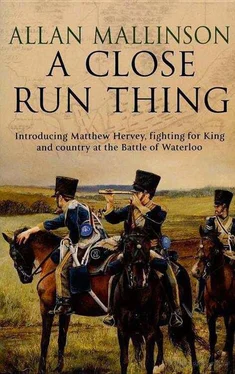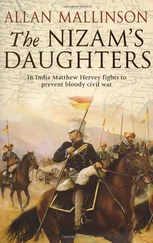Allan Mallinson - A Close Run Thing
Здесь есть возможность читать онлайн «Allan Mallinson - A Close Run Thing» весь текст электронной книги совершенно бесплатно (целиком полную версию без сокращений). В некоторых случаях можно слушать аудио, скачать через торрент в формате fb2 и присутствует краткое содержание. Год выпуска: 1998, ISBN: 1998, Издательство: BANTAM PRESS, Жанр: Исторические приключения, на английском языке. Описание произведения, (предисловие) а так же отзывы посетителей доступны на портале библиотеки ЛибКат.
- Название:A Close Run Thing
- Автор:
- Издательство:BANTAM PRESS
- Жанр:
- Год:1998
- ISBN:9780553507133
- Рейтинг книги:3 / 5. Голосов: 1
-
Избранное:Добавить в избранное
- Отзывы:
-
Ваша оценка:
- 60
- 1
- 2
- 3
- 4
- 5
A Close Run Thing: краткое содержание, описание и аннотация
Предлагаем к чтению аннотацию, описание, краткое содержание или предисловие (зависит от того, что написал сам автор книги «A Close Run Thing»). Если вы не нашли необходимую информацию о книге — напишите в комментариях, мы постараемся отыскать её.
A Close Run Thing — читать онлайн бесплатно полную книгу (весь текст) целиком
Ниже представлен текст книги, разбитый по страницам. Система сохранения места последней прочитанной страницы, позволяет с удобством читать онлайн бесплатно книгу «A Close Run Thing», без необходимости каждый раз заново искать на чём Вы остановились. Поставьте закладку, и сможете в любой момент перейти на страницу, на которой закончили чтение.
Интервал:
Закладка:
His trumpeter, with no cautionary word of command to alert him, blew the call hastily, cracking the first ‘Es’ badly and earning a blistering rebuke. There could in any event have been no more calculated an invitation to bring down Slade’s wrath upon the Sixth than this order. The brigade commander’s belief that cavalry should remain mounted ready for immediate action kept his regiments in the saddle for hours on end, and to no purpose. Edmonds considered Slade’s notion of immediate action to be positively risible in view of his chronic indecisiveness. Sore backs were the bane of the cavalry, and, whether Slade liked it or not, he was damned if he was going to sit there a moment longer for no good reason.
Yet he was not without his doubts, too. He had to admit that the French were fighting with a tenacity he had not seen since Badajoz. Yesterday, Easter of all days, Soult had left three thousand dead and dying on the field before retiring behind the canal and the Garonne. And now, after another day’s fighting, it looked as if that fox of a marshal was going to contest every street in this lovely city. Edmonds was beginning to concede the likelihood of a Fabian march on Paris after all.
These were self-indulgent thoughts, however. One consideration above all pressed to the fore (besides, that is, the ever receding prospect of seeing a tooth-operator): how was he to secure Hervey’s release? Come what may, there were bound to be charges: Slade would be eager to take the opportunity to humiliate the Sixth. The only chance lay in having a general court martial convened instead of one of the cosy field courts where the only concern was to uphold the dignity and authority of the commander — usually, and in this instance, the very officer to have initiated the charges. With Slade it was more a matter of shoring up that dignity and authority, he admitted with distaste. But a proper court, not one packed with toadies, would take the affair with the battery as mitigation. Damn it all, he almost exclaimed aloud, they ought to regard it as justification!
But, pressing though Matthew Hervey’s arrest might be, there was at that moment even more immediate business at hand. All Edmonds’s instincts told him that this was turning into a scrimmage of a battle. A pall of smoke was rising over the city, and he began to wonder whether Slade would stay all afternoon watching, making them mere onlookers to another of Wellington’s infantry battles, with the commander-in-chiefs admonitions afterwards to add insult to injury. Any cavalryman with a sure coup d’œil would now on his own initiative order a steady encircling movement to the north-west to occupy the prominent high ground in anticipation of the artillery. Lord George Irvine had such an eye; so did Lankester and the other squadron leaders; so did a good many of the troop officers — Hervey included. Edmonds was equally sure that Slade did not and never would in a hundred years. The trouble with Wellington, fumed Edmonds (though he would readily admit of his many soldierly virtues), was that he wanted — insisted on — order in his battles. Yet was not the battlefield the very apotheosis of chaos? And was it not the side that could impose the greater chaos that carried the day in battle? And was it not that arm — the cavalry — the arm for which Wellington had least regard, that could create such chaos?
Edmonds sighed. By his estimation they could afford only five more minutes standing like this before the opportunity to take the ground unchallenged might be gone. If no orders came within that time, he knew he would not be able to contain his frustration and that he would go to Slade to suggest the manoeuvre, knowing full well how unwelcome that would be. And, indeed, after five more minutes of fidgeting and stamping by the troop horses, and increasingly tart commentary by the troopers, Edmonds had had enough. Sighing deeply, and cursing some more under his breath, he remounted and called again for his senior captain.
Lankester trotted up on his big bay thoroughbred and saluted.
‘You are to assume command. You are to prepare to occupy yonder hill with the white church,’ began the major, pointing to a small chapel a mile away. ‘That bridge midway will have no more than a few videttes, likely as not. I shall now alert the brigadier to my intentions. However, on no account save for the immediate security of your command are you or any part of the regiment to quit this ground until I return.’
Edmonds did not have to elaborate on the manoeuvre or its purpose. Indeed, he would have been dismayed to think that Lankester had not anticipated it. The captain simply saluted to acknowledge the orders, and a half-smile indicated that he recognized the tone well enough. Edmonds had reverted to the formal and precise manner which prudence suggested was necessary when in the field with General Slade. It added, too, a distinct charm to the Sixth’s campaign journal, written up assiduously at the end of each day by the adjutant, who scribbled every word faithfully in his pocket-book to that purpose. But principally, and at Edmonds’s insistence, the scribbling was less a matter of historical detail than a record to be used in evidence — not against an officer, but by one if events did not prove propitious: he wanted no subordinate to be in a position of disadvantage. It was needless in this instance, for the notion that Lankester would plead superior orders in mitigation if events went ill would have been entirely repugnant to that officer.
The gallop to the knoll on which Slade and his staff had posted themselves, half a mile distant, steeled Edmonds to the exchange to come, but as he neared the top he saw General Cotton galloping towards them from the opposite direction, waving his hat and hallooing wildly. Hervey was lying on the ground nearby with Slade’s physician hunched over him, but it was the cavalry commander’s dramatic approach that gripped Edmonds’s attention. Cotton began shouting from fifty yards distant. ‘Slade, the French are giving way! Soult’s pulling back into the city: there’s no fight left in ’em!’
Sir Stapleton Cotton, lieutenant-general, sixth baronet of Combermere, and Uxbridge’s successor — there was little doubt that his birth had recommended him to Wellington, but there was such a close physical similarity between the two men that Edmonds could not but ponder on the tendency of commanders to select subordinates in their own image. There were the same dark curls, the long face, the hooked nose, and hardly a year between them, too. What was Wellington now, forty-four? forty-five? Four years younger than Edmonds himself — it was enough to test the resolve of a saint. Admittedly he liked Cotton well enough. The man had done his share of fighting in the Peninsula, and before that, too, and he had been sound enough on the retreat to Corunna — but he was no Uxbridge. Edmonds knew that, in the business of war, he was Cotton’s equal. What, then, had ordered their respective military estates? Just twenty thousand pounds for a baronetcy a couple of centuries earlier when King James had wanted money for his Irish army, he supposed, and one or two judicious marriages thereafter no doubt. Well, so be it: his father had been a professional soldier who had died in the American war while Edmonds was still a child, leaving nothing but the value of his commission with which his widow could buy an annuity. And he himself had chosen to marry a soldier’s daughter without a penny, either. A stoical smile almost overcame him, but another stab in his jaw made him grimace instead. What he was to hear next, however, as General Cotton pulled up sharply, almost cannoning into the brigade commander, would certainly tempt the smile back, albeit a wry one.
‘The commander-in-chief desires his cavalry to stand fast for the time being but wishes you to send, if you please, a troop to occupy the high ground north-west of the city. It is his intention to send guns there directly.’ Cotton was pointing to the same high ground that Edmonds knew Captain Lankester to be contemplating at that very moment.
Читать дальшеИнтервал:
Закладка:
Похожие книги на «A Close Run Thing»
Представляем Вашему вниманию похожие книги на «A Close Run Thing» списком для выбора. Мы отобрали схожую по названию и смыслу литературу в надежде предоставить читателям больше вариантов отыскать новые, интересные, ещё непрочитанные произведения.
Обсуждение, отзывы о книге «A Close Run Thing» и просто собственные мнения читателей. Оставьте ваши комментарии, напишите, что Вы думаете о произведении, его смысле или главных героях. Укажите что конкретно понравилось, а что нет, и почему Вы так считаете.









